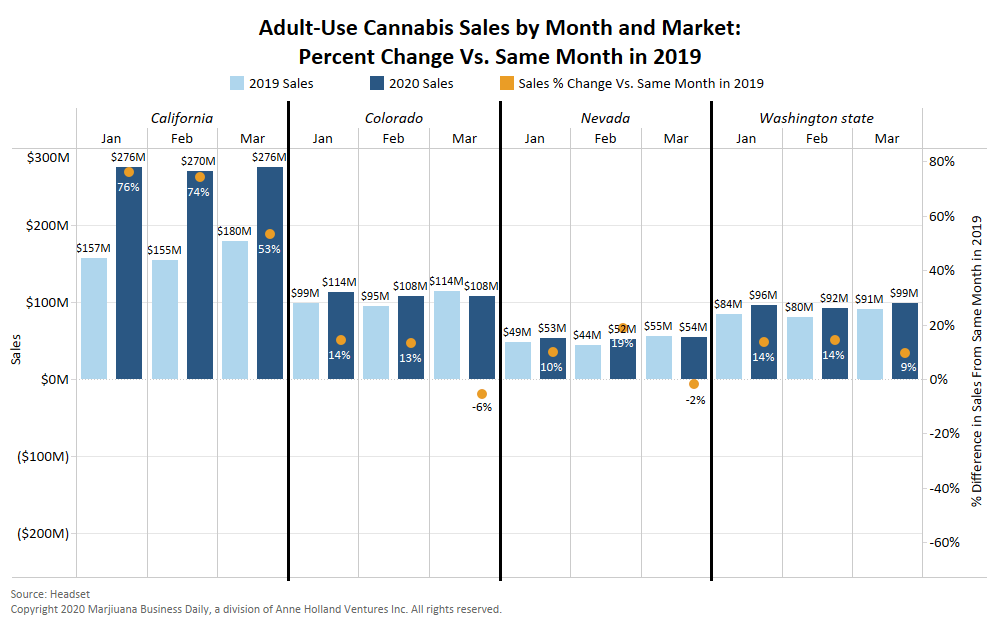Cannabis companies are entering a new normal as the coronavirus pandemic puts stress on every sector of business, fundamentally altering the industry in possibly permanent ways.
The COVID-19 outbreak has exacerbated fault lines in the rapidly evolving market and led to number of new outcomes, including:
- Retailers adapting to changing consumer behavior by offering delivery, curbside pickup, etc.
- State-by-state legalization movements hitting major obstacles.
- Businesses hoping for post-pandemic real estate deals.
- An acceleration of acquisitions and business failures, specifically in California.
- Canadian companies making the best of market uncertainty and changing regulations.
- Firms reevaluating the viability of the international supply chain.
“Don’t plan for disruptions to end on your timeline,” said Sumit Mehta, CEO of San Francisco-based investment group Mazakali.
Buyer behavior
Consumers’ purchasing habits are changing, including the method they use to buy cannabis products. Online ordering, delivery, curbside pickup and drive-thru lanes are likely here to stay as customers recognize their ease of use.
“There will be somewhat of a switch to delivery,” said Dan Zaharoni, CEO of From the Earth in Santa Ana, California, which has been delivering cannabis products for more than a year.
Mike Werner, chief business officer for Oakland, California-based dispensary Nug, said a switch to curbside pickup and delivery will limit the interaction his employees have with customers.
“Social distancing has made people not really want to go into a store and mill about,” Werner said.
Political setbacks
The coronavirus pandemic has stalled legalization and reform efforts in the short term as state and federal lawmakers deal with more pressing public-health and economic issues.
Recreational marijuana legalization in New York is on the shelf for now, and a number of voter initiatives in states across the country won’t make the November ballot because the outbreak is preventing groups from collecting the signatures they need.
But industry officials and advocates believe the pandemic might have some positive long-term impacts in moving state legalization and federal marijuana reform efforts forward.
That’s in part because the outbreak has led many states to formally classify cannabis as an “essential” business, tacitly if not directly recognizing the medical benefits of marijuana and the need for wide public access.
Real estate opportunities
Before the COVID-19 crisis, many store owners were spending six figures on tenant improvements to enhance the shopping experience for their customers. While those renovations might be on hold, they could pay dividends when the crisis comes to a close.
By the same token, once the health crisis is in the rearview mirror, marijuana stores might be courted by shopping centers that are seeking tenants willing to pay higher-than-market-rate rents.
Marijuana companies wishing to expand or rent new space might even find better deals post-crisis than before the pandemic began.
And it’s not just cannabis retailers that could find real estate deals when the crisis wanes.
Ben Larson, CEO of Oakland, California-based Vertosa, which makes active ingredients for infused product manufacturers, had been looking for space to consolidate its laboratory and business office before the coronavirus outbreak. Those plans have been put on hold until the spread of COVID-19 is under control.
“We’ll be in a hell of a negotiating position when we come back and probably be able to get a space of our choosing at a great rent price,” Larson said.
Faster industry contraction
The coronavirus is likely to accelerate a number of business failures and acquisitions in California’s marijuana industry, which was already laden with systemic financial problems that began in 2019.
Cannabis stocks started plummeting early last year because of unmet earnings projections and overly optimistic expectations.
That led to a widespread retreat of investors, which in turn resulted in many financial deals and expansion plans falling through. The supply chain then grew rife with unpaid bills and debts.
In 2020, those debts are coming due, and many companies simply don’t have the capital to pay them off. Even some distressed asset funds have put their plans on hold until the implications of the coronavirus are clear.
Without access to traditional banking services, business loans or even the same type of coronavirus-related relief other mainstream industries can receive from the federal government, many of those companies are likely to look for a larger firm to acquire them. Or, if times get truly desperate, the business could land on the auction block.
Uncertainty in the north
In Canada, the COVID-19 crisis has seen cannabis stores stay open as essential services in the majority of the nation’s 13 provinces and territories. Although some cultivators have implemented pandemic-related layoffs, none have fully shut their doors.
Consumer demand for cannabis appears brisk, although definitive retail sales data remains weeks away.
In Ontario, Canada’s single biggest provincial cannabis market by population, retailers previously deemed essential were forced to shut down after the government expanded closure orders.
Only a few days later, Ontario threw those shuttered retailers a lifeline and temporarily allowed home deliveries and curbside pickups, which were previously forbidden for private cannabis retailers in the province.
It remains to be seen whether those retailers can quickly capitalize on the temporary e-commerce opportunity and keep their customers buying.
Supply-chain jitters
The pandemic exposed the vulnerability of the cannabis supply chain, especially for companies sourcing material from overseas markets such as vape hardware and packaging.
When China shut down manufacturing at the beginning of the year amid the outbreak, marijuana firms anxiously sought out domestic alternatives, only to find them nearly nonexistent.
Fortunately for the industry, the factories in China are reportedly spinning back up, and cannabis companies that source materials from Asia and other international sources should be able to receive them.
But it’ll likely take longer and come packaged with no small amount of additional anxiety about when the supply chain could experience its next major disruption.
Solomon Israel, Margaret Jackson, John Rebchook, John Schroyer, Jeff Smith and Nick Thomas contributed to this report.
For more of Marijuana Business Daily’s ongoing coverage of the coronavirus pandemic and its effects on the cannabis industry, click here.







